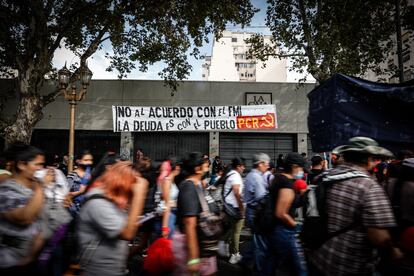Demonstrators protest against the agreement between Argentina and the IMF, on March 17, 2022. Juan Ignacio Roncoroni (EFE)
Argentina's novel with the IMF is not over.
The board of directors finally approved this Friday to refinance a debt of 44,000 million dollars and has already delivered to Buenos Aires the first installment of the agreement, for 9,650 million.
But the organization's managing director, Kristalina Georgieva, warned that the commitments assumed by the Government of Alberto Fernández face "exceptionally high risks", as a result of the war in Ukraine.
The agreement, said Georgieva, will require "early recalibrations" to adapt the goals assumed by Argentina for inflation and fiscal deficit.
The scenario has changed dramatically since the agreement was drafted.
Argentina committed to the IMF to achieve fiscal balance in 2024, lower inflation (which today exceeds 50% per year) and reduce energy subsidies (in 2021 they reached 11,000 million dollars, equivalent to 2.3% of the GDP).
The goals now seem unattainable, given the skyrocketing energy prices.
Although Argentina is a producer of crude oil and gas, it subsidizes household rates with millions of dollars, in an attempt to avoid a price rise that put even more pressure on inflation.
The agreement with the Fund assumes that Argentina will receive within 30 months the 40,000 million dollars necessary to cancel the credit received by the Government of Mauricio Macri in 2018. The money will enter Argentina and will immediately return to the IMF, in a pass of zero-sum hands.
But the South American country should not use international reserves to meet payments.
The intention is that you take advantage of the grace period of two and a half years to recover your economy and, with this, your ability to pay.
The IMF has said that the agreement reached is "pragmatic, realistic and credible".
"It contains a carefully calibrated set of economic policies," Georgieva said.
“Sustained, growth-friendly fiscal consolidation will strengthen debt sustainability and allow monetary financing to be removed from the fiscal deficit, helping to begin to address persistently high inflation,” she added.
However, the director of the IMF also warned of the problems facing Argentina: "Although an economic and employment recovery is underway, it continues to face exceptional economic and social challenges, including depressed per capita income, high levels of poverty, persistent high inflation, a heavy debt load and low external buffers”.
The negotiation with the Fund took almost two years, the time that has passed since the Fernández government agreed to refinance 68,000 million dollars owed to private investors.
The Argentine Economy Minister, Martín Guzmán, then promised a speedy agreement with the IMF.
But the differences within the government coalition complicated things, especially due to the opposition of the vice president, Cristina Fernández de Kirchner, to any concession that would imply an adjustment of the economy.
President Fernández finally closed an agreement, but at the cost of breaking up the Frente de Todos and moving away from Kirchnerism.
The deputies and senators who respond to the vice presidents voted in Congress against the understanding with the Fund.
The war in Ukraine and the disaster it caused for the price of
commodities
changed the scenario.
The agreement between Argentina and the IMF was old before its premiere, so much so that the parties have now agreed to advance the quarterly reviews on which the disbursements will depend.
The first exam scheduled for July will be held in May.
Noting that the spillover effects of the war in Ukraine are materializing, Directors welcomed the authorities' agreement to move forward the first review of the program and urged them to recalibrate policies, as necessary, to ensure fiscal objectives. and contain the second-round inflationary effects of rising commodity prices," the IMF said in a statement.
Argentina had to pay next week an expiration of 2,800 million dollars, a sum that it does not have.
With the entry of the first 9,650 million dollars of the agreement, it will be able to comply with the payment and, at the same time, add 6,850 million dollars to the reserves of the Central Bank.
The challenges, however, are enormous.
Due to the deterioration of the international context, the Government must manage the internal political fracture.
Subscribe here to the EL PAÍS América
newsletter
and receive all the key information on current affairs in the region.

